Sammy AwamiBBC Africa, Antananarivo
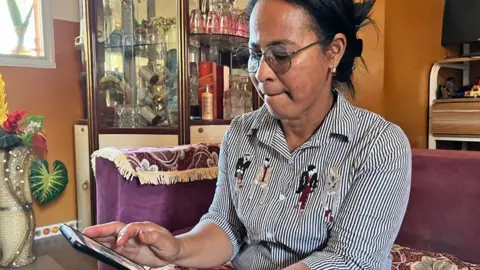 Sammy Awami / BBC
Sammy Awami / BBCRazanasoa Edmondine still looks shell-shocked as she recalls the death of her one-month-old grandson, killed by police tear gas in protests that have rocked Madagascar over the last two weeks.
“It was just a normal Friday. My daughter-in-law was going to the market with the baby when they encountered demonstrators on the road,” she tells the BBC at the family’s home on the northern outskirts of the capital, Antananarivo.
“Not long after, police showed up and started dispersing the protest with tear gas.”
It was the second day of youth-led protests, triggered by anger over persistent power and water shortages, and Ms Edmondine’s daughter-in-law ran into a nearby building with other protesters to take cover.
Police then fired more tear gas canisters into the building, quickly filling it with choking smoke.
With the streets in chaos, they could not get to a hospital until the following day. By then, the damage had been done.
“The baby was trying to cry but no sound came out,” says Ms Edmondine softly.
“It was like something was blocking his chest. The doctor told us he had inhaled too much smoke. A couple of days later, he passed away.”
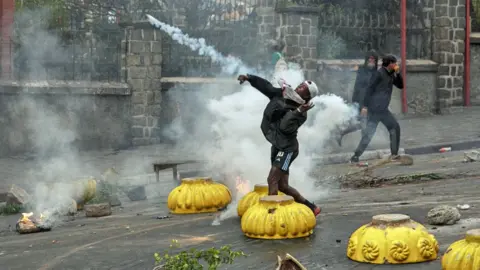 AFP/Getty Images
AFP/Getty ImagesHer grandchild is one of at least 22 people the UN says were killed during clashes between police and demonstrators in the early days of the protests, which have since escalated into broader dissatisfaction over corruption, high unemployment and the cost-of-living crisis in one of the world’s poorest nations.
The government of President Andry Rajoelina has dismissed this figure as misinformation but has not provided its own numbers.
However, it has emphasised that the value of property damage exceeds $47m (£35m). The first days of the protests were marked by widespread violence, with cars set on fire, shop windows smashed and a two-month-old, multi-million-dollar cable car station vandalised.
Rabe, who only gave the BBC his first name, has accused the police of firing live bullets at peaceful protesters – a few blocks away from where Ms Edmondine’s daughter-in-law was hiding.
As police launched tear gas, panic spread fast and people fled in every direction, seeking shelter inside any open building, but he says his 20-year-old autistic son did not understand what was happening.
“He must have slipped outside to see what was going on. That’s when the police shot him and continued chasing other protesters.”
He believes his son was shot from the front, as the bullet left a large open wound in his back – the likely exit wound.
“I don’t know much, but as far as I know, when someone raises their hands, it means they haven’t stolen anything, they haven’t vandalised anything,” says Rabe. “He was just there to see what was happening.”
Responding to accusations of police brutality, earlier this week President Rajoelina said: “There have been deaths, we completely agree. And I truly sympathise with the suffering and pain of the families who have lost loved ones.
“But I want to tell you that these deaths are not protesters, they are not students. They are rioters. They are the ones who looted.”
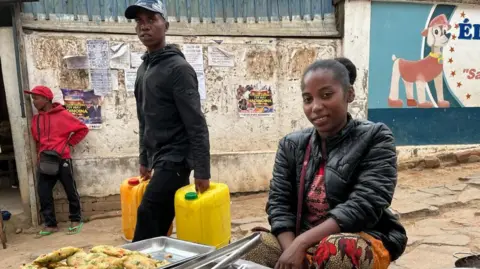 Sammy Awami / BBC
Sammy Awami / BBCSome business owners say the prolonged protests have disrupted commercial activity and cut into their income, especially for those in city centre neighbourhoods around the University of Antananarivo, from where the protests have been organised.
“I fully support Gen Z, but I don’t think protests are the right way to address their grievances. When people demonstrate, I can’t do business,” says Laza Brenda, who runs a roadside mobile phone repair kiosk.
For entrepreneur Ulrichia Rabefitiavana, the uncertainty has spooked several of her international clients, who have cancelled contracts for training and seminar events.
“We’ve had to postpone a major event involving more than 2,000 people that we’ve been preparing for over six months. It was supposed to take place this week. It’s been very challenging for us to postpone everything and lose that money,” says Ms Rabefitiavana.
The tourism sector on the Indian Ocean island, which is famous for its unique wildlife, is among the hardest hit with the situation catching most people by surprise.
“We have received nothing but cancellations. Normally, the period of mid-September and October is the busiest period for us,” says François van Rens from the Radisson Hotel Group.
“We normally operate around 60, 70% occupancy but we have now dropped down to 10%. So it’s like in full throttle and all of the sudden the handbrake.”
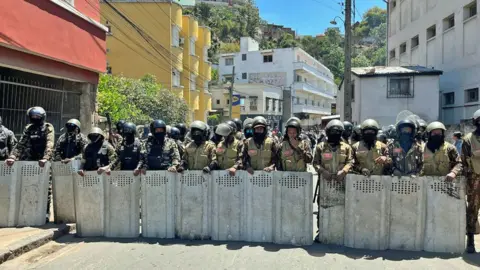 Sammy Awami / BBC
Sammy Awami / BBCThe anger of the youth movement behind the demonstrations, known as Gen Z Mada, has grown with the protesters now calling for the president to step down.
The evidence of young people’s frustrations, whether it is unemployment, water scarcity or struggling businesses, is not hard to find across Antananarivo.
At the airport, for example, visitors with just a few bags are quickly surrounded by two or three young people eager to help in exchange for a small tip.
Anyone leaving their car parked outside a cafe or restaurant will almost certainly be approached by a couple of young men asking for a fee after claiming they have “guarded” the vehicle.
On the roadside, a young woman selling sweet doughnuts tells the BBC she earns $2.30 a week, money she relies on to feed her four-year-old child.
“I’m only allowed to do business at this spot on weekends because during the week someone else uses it for their own business,” she says while turning the dough in boiling oil.
Driving through the outskirts of Antananarivo, it is common to see families washing clothes in paddy fields, a visible reminder of the severe water shortages in people’s homes.
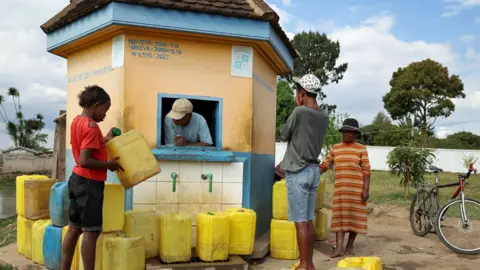 Reuters
ReutersOne of the main protest organisers, who requested anonymity for safety reasons and organised to meet us near the rice fields, told the BBC he had to walk a mile each day to get water from a well – and he considers himself middle-class.
“To be a young person in Madagascar, you have to be tough,” he adds, explaining that insecurity is rife.
“You live in constant fear of when your house will be broken into, when you will be shot by people, when you’ll be stabbed on the streets. It’s like your humanity has been stolen from you and taken away.”
He demands “radical change” to deal with the island’s chronic socio-economic challenges.
According to Hery Ramiarison, professor of economics at the University of Antananarivo, these are the result of decades of poor economic planning and the government’s failure to create inclusive wealth.
“There is a huge employment problem among young people,” he explains.
“It stems from very low levels of education in the labour force, serious deficiencies in the education system both in quantity and quality, widespread school dropouts, and a near-total absence of training opportunities adapted for them.”
The academic finds it striking that after 64 years of independence, three-quarters of the population have an education level below primary school, while only 3% have attained higher education.
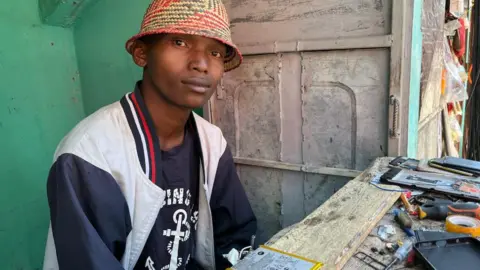 Sammy Awami / BBC
Sammy Awami / BBCPresident Rajoelina has asked the Malagasy people to give him one year to fix the problems driving the protests, saying he will resign if fails to meet the deadline.
But Prof Ramiarison feels the president does not understand the complexities of how Madagascar has become trapped in two vicious circles of poverty that feed into each other.
One is driven by weak economic growth, the other stems from political instability, which discourages investment and growth and pushes people deeper into poverty, fuelling social unrest.
“To break free from the poverty trap, it is essential to first break the primary vicious circle by addressing its root causes – namely the key determinants of economic growth,” he says.
Madagascar has experienced repeated political turmoil since gaining independence from France, including the mass protests in 2009 that toppled then-President Marc Ravalomanana – the once popular dairy tycoon.
That saw the rise of Rajoelina, a former DJ and then the mayor of Antananarivo, who seized power in the aftermath.
From his roadside phone shop, Mr Brenda says: “Once they’re in power, they forget us. It’s always the same.”
More on Madagascar’s Gen Z crisis:
 Getty Images/BBC
Getty Images/BBC


